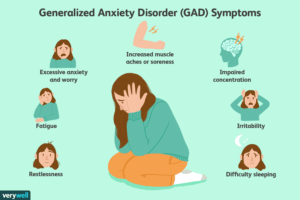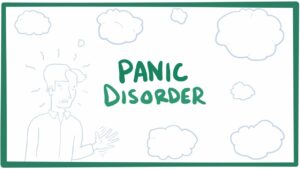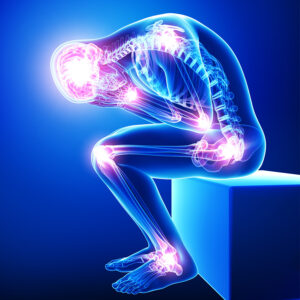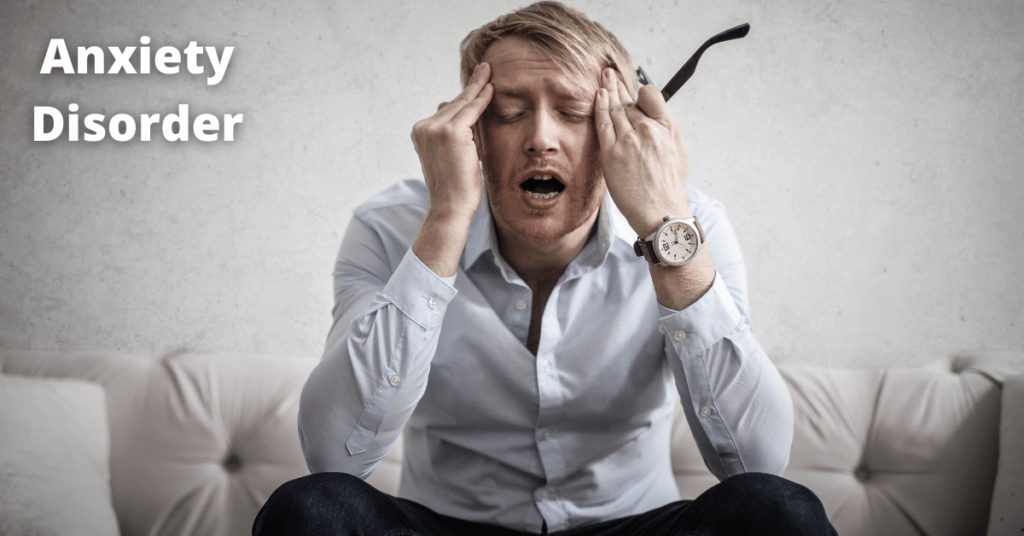Contents
Anxiety Disorders

Anxiety is a normal emotion that may occur in people when they are stressed. The condition of the brain depends on how you react to situations that come to you. One can experience anxiety while giving an important test, or taking a life decision. It is okay to have occasional anxiety, but you may need to take therapies or need to see a doctor when it gets recurring. This anxiety makes you avoid attending your school, office, or even family get-togethers. If we see the positive side of anxiety, it warns us of a dangerous situation and enables us to focus our attention in one place. But if it goes beyond nervousness, it gets harmful. It turns into anxiety disorder when:
- It starts interfering with your ability to function.
- You start overreacting when something or somebody triggers your actions.
- You start losing control of your responses towards the situations.
Various studies say that anxiety disorder is one of the most common forms of mental disorders. 30% of the adults go through anxiety due to work, relationships, finance, psychosocial, and many other reasons. Fortunately, there are treatments available for the betterment of people who are suffering from anxiety and are unable to overcome the issue. The first move should be to figure out the type of anxiety disorder that you are facing so that you can take the appropriate treatment or therapy.
Types of Anxiety Disorders
There are 8 prominent types of anxiety disorders that people may have:
Generalized Anxiety Disorder

It is a situation that includes persistent anxiety and worries about activities, people, or even events. Most significant is the fact that the worry is out of proportion and is irrelevant to the circumstance. It is difficult to control and puts a great impact on a person’s physical well-being. It generally leads to depression and if you do not take any timely treatment, the situation worsens and the anxiety becomes chronic.
Agoraphobia

It is a type of anxiety disorder that makes people care and avoid going to places or taking situations that may cause panic and you feel trapped, helpless, or embarrassed. People suffering from agoraphobia love to be isolated as they feel safe there.
Anxiety Due To Medical Condition
Sometimes we come across people who have suffered some traumatic accident in life and now they are trying to overcome the same. Such incidents cause anxiety in such people and make them fear the situation for a long time. It also includes symptoms of intense anxiety and panic.
Panic Disorder

This type of anxiety disorder involves repeated episodes of sudden feelings of fear which may reach its peak in a short interval of time, say a few minutes. The consequence may be shortness of breath, chest pain, a fluttering or pounding heart. These characteristics may be disturbing when they start occurring again and again and the victim starts to avoid the situations.
Selective Mutism

It is a disorder that marks the consistent failure of children disabling them to speak in certain situations, like school even when they are confident enough to speak in front of their family members. This can have an adverse effect on their performance in school, and work in the longer run. It can also have an impact on their social functioning.
Anxiety Disorder Due To Separation
It is the type of childhood disorder that can be categorized by a type of anxiety that occurs in children due to the fear of separation from their parents and other guardians who have parental roles in their life.
Social Phobia
This type of anxiety disorder involves high levels of avoidance of social situations like family get-togethers or hanging out with friends. It happens due to the feeling of embarrassment, self-consciousness, and worry about being judged negatively by the other members of the group.
Specific Phobias

This situation is characterized when anxiety happens due to the exposure of a specific thing or a person with whom they have a traumatic situation. Such phobias are known to provoke panic attacks in some people. People can have these specific phobias from various things, like water (hydrophobia), closed areas (claustrophobia), height, etc. These are all the different types of anxiety disorders that a person may experience in life. To get over the different types of anxiety disorders, one must monitor his activities to know the symptoms in a better manner.
Symptoms of Anxiety Disorder
The most prevalent symptom of anxiety is excessive fear. This can also make it challenging for a person to breathe, sleep, and concentrate on his work. These symptoms may vary on the basis of the type of anxiety disorder that he is suffering from. The most common symptoms of anxiety disorder are as follows:

- Panicking and getting frightened over things that are normal.
- Experiencing an unusual uneasiness while interacting with people or socializing.
- Feeling of danger in a room filled with people
- Facing sleep problems, even after a tiresome day.
- Not being able to stay still and calm
- Tingling in the fingers, or having the body numbed, cold, or sweaty.
- Feeling shortness of breath and chest pain
 Breathing faster than the normal speed, often called hyperventilation.
Breathing faster than the normal speed, often called hyperventilation.- A pounding and fluttering feeling in the heart
- Feeling dryness in the mouth and excessive thirst.
- Inability to concentrate on the work
- Avoiding certain objects and places obsessively
- Feeling of absurd muscle tension without any injury
These are all the symptoms that a person may suffer from while having anxiety disorders. These symptoms may worsen if not corrected in time. You can use various therapies or consult a psychologist or psychiatrist to get advice on what to do while having these symptoms. Make sure that your psychologist knows your medical history and any evident incident that may have happened. This will help him to know the exact cause of your anxiety and he will be able to suggest the best therapy.
Causes of Anxiety Disorder
Researchers say that there is no exact cause of anxiety. They also mention that any traumatic events can cause anxiety disorders if the person is already prone to anxiety. There are some medical causes that can be linked to anxiety such as:

- Thyroid problems
- Heart Disease
- Anti-anxiety medications
- Brain Chemistry
- Chronic pain
- Rare tumors
- Respiratory Disorders
- Misuse of Drugs
Risk Factors for Anxiety Disorders
Although there are no fixed causes of anxiety, there are some definite risk factors for anxiety. The factors that can risk the development of anxiety are as follows:
People who have witnessed any traumatic events in their childhood or have endured abuse are at high risk of developing anxiety disorders. Even if you are someone who is very close to the victim of any trauma, you are at risk of anxiety.
In today’s life, everyone is dealing with stress. But if it is excessive and unresolved, it can increase the chances of anxiety.
Genetics
Sometimes anxiety can run in your genes. If a family is having an anxiety disorder, then it can increase the chances of the development of anxiety. The risk is even high if the parent is with anxiety.
Personality
Some people are more prone to anxiety disorders than others. Like people with type A personalities have a high risk of developing an anxiety disorder.
Gender
It is seen that women have more chances to develop anxiety disorders than a male because of the hormonal changes in their life at different periods of time.
Self- Confidence
When you have very little confidence in yourself or negative perceptions about yourself, this may lead to social anxiety disorder.
Diagnosis of Anxiety Disorder
If you have observed any symptoms related to anxiety, visit a doctor immediately. The doctor will inquire about your health conditions. He or She can examine if the anxiety is related to your physical health by any chance. If there is nothing related to your physical health, you need to visit a psychologist or any other mental health specialist. The psychiatrist will ask you some questions and will test if you have an anxiety disorder. They will examine how intense the condition is after diagnosing you.
If you are having any difficulty in doing work at home, school, or anywhere, You should let your doctor know.
Treatment of Anxiety Disorder
Anxiety Disorder can be treated. The treatment methods are used to manage or reduce the symptoms of anxiety disorder. The most common way to treat anxiety disorder is consulting a psychiatrist or using some medications.
Medications
There are a variety of medications to treat anxiety. Medications are used on the basis of symptoms, type of anxiety disorder, or on the basis of physical and mental health issues. Some of these medications are:

- Antidepressants: These are the most common medicines used for anxiety as well as depression. Some of these antidepressants are Serotonin Reuptake Inhibitors (SSRI), Fluoxetine, Prozac, or Celexa.
- Benzodiazepines: This is a drug that a doctor rarely prescribes to any patient as they are highly addictive. They have certain side effects to them as well.
- Tricyclics: Doctors recommend these drugs for anxiety disorders other than OCD. These can cause certain side effects as well such as drowsiness, dry mouth, etc.
Some other medications are Monoamine Oxidase Inhibitors (MAOIs), beta-blockers, buspirone. If the doctor has prescribed you any of these medications, if the after-effects become severe, consult a doctor.
Therapy

The most important and common method of treating Anxiety disorders is taking therapy. The most common therapy is Cognitive-behavioral therapy (CBT). There are other combinations of therapies as well.
CBT is the most effective psychotherapy which is used for anxiety disorders. CBT is teaching skills to improve the symptoms of anxiety and can do the activities which you are not doing because of anxiety. It includes the encounter of the situation that can cause anxiety. It can build confidence so you can manage the anxiety symptoms.
Other Remedies
Almost everyone needs medications or therapy to control, there are other remedies as well to control anxiety disorders. There are some everyday changes as well that can make a change.

- Avoid alcohol and drugs
- Avoid smoking
- Sleep well
- Eat good food
- Avoid caffeine
- Use stress management
- Be active
- Keep a journal
- Learn how to manage time and energy
- Socialize with people
- Do yoga and meditation
A Word From Mantra Care
Your mental health — your psychological, emotional, and social well-being — has an impact on every aspect of your life. Positive mental health essentially allows you to effectively deal with life’s everyday challenges.
For more information, please contact MantraCare. Anxiety is a common mental health condition characterized by persistent feelings of worry, fear, and apprehension. If you have any queries regarding Online Anxiety Counseling experienced therapists at MantraCare can help: Book a trial Anxiety therapy session



